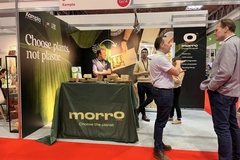Breaking bakery barriers: Treetop Biopak introduces compostable bread bags
10 Jan 2024 ---Treetop Biopak has introduced a new home compostable bag, addressing the environmental challenges posed by packaging waste in the fresh bread market. The company supplies compostable packaging materials, including bags, cling film and various wrapping films.
Treetop Biopak says its compostable bags offer a more environmentally sustainable end-of-life solution, unlike conventional plastic bags. These bags are designed to decompose when disposed of properly, leaving no microplastics or pollutants behind.
Treetop Biopak founder Amir Gross tells Packaging Insights: “We can help clients to balance their quality and performance with consumer requirements for compostable solutions to reduce waste plastic. This allows a whole range of goods to maintain their freshness, ensure the required shelf life, while minimizing any impact on the environment.”

This development of sustainable bread bags is aligned with the new preferences among consumers, with compostable packaging now considered the most sustainable option, surpassing paper and recycled materials.
Transforming bakery packaging
The fresh bread market has been under scrutiny for its environmental footprint, primarily due to the amount of plastic for bread bags used daily by consumers and food service providers.
 The bag looks different to their plastic counterparts so customer can tell that they are compostable.These bags, often ending up in landfills or incinerators due to low recycling rates, contribute largely to environmental pollution. Treetop Biopak’s initiative is a direct response to the challenges, contributing to sustainability within the bakery industry.
The bag looks different to their plastic counterparts so customer can tell that they are compostable.These bags, often ending up in landfills or incinerators due to low recycling rates, contribute largely to environmental pollution. Treetop Biopak’s initiative is a direct response to the challenges, contributing to sustainability within the bakery industry.
A key aspect of bakery packaging is the balance between extending food shelf life and reducing material usage, for products like bread, which have a limited freshness period, packaging technologies and materials that can prolong their lifespan are essential to curb food waste and reduce global greenhouse gas emissions.
Treetop Biopak’s solution involves a single-layer material with enhanced barrier properties tailored for bakery products. This innovative approach has proven effective in maintaining the shelf life of fresh bread products.
Through testing, these compostable bags demonstrated good shelf life performances, including a 7-10 day preservation period for sliced bloomer and sourdough bread. Moreover, the bags have shown satisfying machinability on automatic bread bagging lines, facilitating smooth operations for bakeries and manufacturers.
“Barrier to moisture is crucial when packing bakery products such as bread. It has always been a challenge with compostable films and was overcome by using laminates, which are expensive. Treetop’s new single layer film has a higher barrier level which maintains bakery products' freshness. It was tested with products such as sliced bloomer and sourdough bread and was shown to provide the shelf life needed without compromising quality, ” says Gross.
Further trials by Treetop on various bakery products, such as pancakes and small cakes, have validated the material’s versatility and effectiveness in different applications.
Compostable food pack innovations
Treetop Biopak’s compostable bags align with the trend of circular economy and have the potential to reduce the plastic footprint of manufacturers, retailers and brands.
“Treetop is focused on compostable packaging and our new Terra Compost range of packaging provides a wide range of solutions. These are all high volume applications of plastic and a move to compostable would reduce tons of plastic from the environment,” highlights Gross. The primary tool of packaging is to preserve what it contains while keeping plastic minimized.
The primary tool of packaging is to preserve what it contains while keeping plastic minimized.
“Treetop’s range of products is designed to integrate into existing production lines. We have done numerous trials with our materials on production lines, at our customers’ factories. The trials show that compostable packaging can work on existing lines.”
Sealpac has also introduced sustainable packaging solutions that emphasize freshness optimization with minimal plastic usage to reduce overall waste. The company provides customization options, allowing customers to incorporate informative details or brand-specific features on packages with a cardboard base.
Last year, Notpla, a UK-based company, was the first industry player that has been recognized by an EU state for producing completely plastic-free food packaging from seaweed, which can be recycled with paper streams or composted at home.
Detpak, an Australian packaging company, made a parallel effort by launching the “Vanguard” range in collaboration with Eco-Products, featuring compostable plates, bowls and containers. This release positions Detpak as the first Australian business to provide PFAS-free, compostable packaging.
By Sichong Wang













